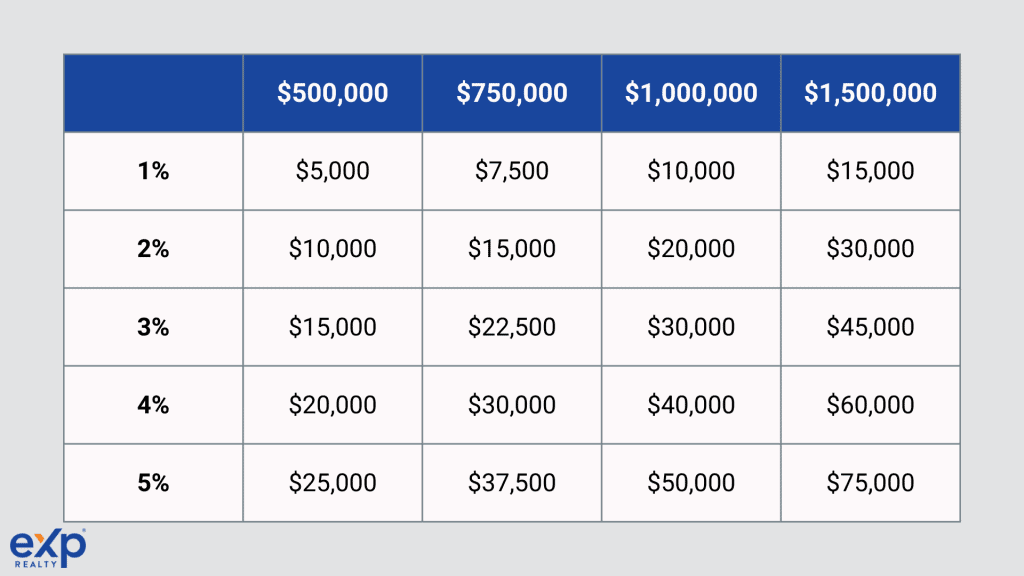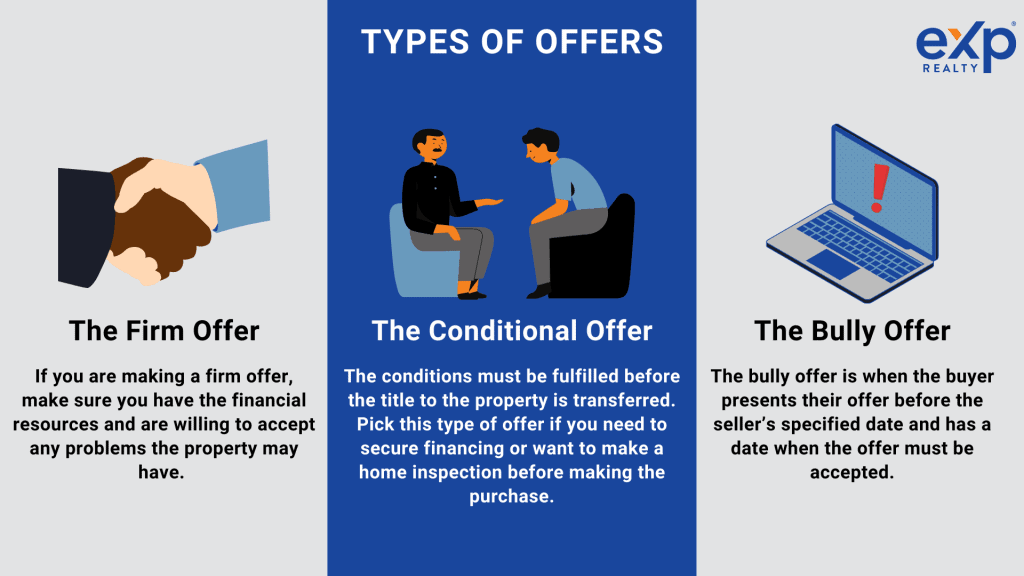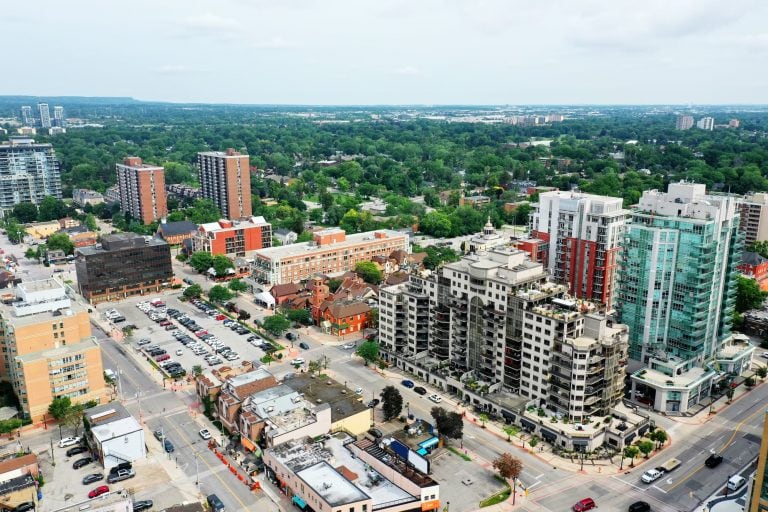When you’ve chosen a house you’d like to purchase, presenting an offer to the seller is usually the next step. Every homebuyer undergoes this stage no matter where they reside, the type of property they’re acquiring, or the market conditions. However, making a purchase offer on a home in today’s real estate market in Canada may be especially intimidating. You might deal with intense bidding wars, impossible above-asking prices, and even people willing to waive all the conditions before signing their mortgage.
The best approach to successfully coming out of the process is to anticipate that it will be competitive and do everything possible to make your offer stand out. To help you out, in this blog post we will dive deep into everything that goes into placing an offer on a house so you can craft a winning offer. Let’s go!
The Basics Of Making An Offer On A Home
What’s An Offer On A Property?
An offer is a written contract that specifies the price you are ready to pay for a piece of property and any obligations that must be fulfilled for the transaction to go through. No offer is equal to another, and depending on the market conditions you’re buying in, you might have to submit more than one offer to obtain your dream home. Once both the buyer and the seller agree to the conditions of the offer, the sale and purchase agreement is finalised, and the closing process can formally begin.
When Is The Buyer Ready To Make An Offer?
Once you decide home ownership is the right path for you, there is much to do before drafting and submitting your offer to the seller. Buying a house isn’t simply hiring an agent and picking out a property from the many listings in your area. There is a lot of research, money, and effort involved, especially if you are in a competitive housing market like Canada, where cities like Toronto and Vancouver are seeing record-breaking prices owing to booming demand and supply shortages.
You need to exhaust several steps before placing an offer on the house in order to make it more appealing to the seller. These are the basics of the homebuying process:
- Get pre-approval for a mortgage: This tells the seller that a lender is willing to give you a loan for the amount you’ve offered them.
- Find an experienced real estate professional to assist you: This person will write up the offer for you and send it to the seller.
- Look for houses that fit your budget: This reduces your house-hunting efforts to properties with affordable estimated monthly payments and downpayment.
- Find a home you’d like to purchase: Who would you send the offer to if you haven’t found the right home?
When Is The Seller Ready To Review Offers?
In hot real estate markets, multiple offers are a common occurrence and they are known as bidding wars. In this type of situation, the seller’s agent (a.k.a listing agent) organises offer registrations with a specific date and time to make sure the process will run smoothly. They organize the offer presentations the same way.
The buyer and their agents have the right to know the amount of offers registered in advance so they can decide if they want to join the race or pursue a different property instead. If you are interested in the property, get your offer registered and let the seller’s agent and broker know you have an offer.
The Offer’s Main Components
After completing the previously mentioned home buying steps, you should be ready to place a potentially winning offer on the selected home. Let’s break down the essential elements of the purchase offer:
1. The Necessary Documentation
Your agent will prepare the required paperwork once you are ready to offer on a property. According to Canada Mortgage and Housing Corporation (CMHC), your offer documents must contain the following particulars to be considered valid:
- Your name, the seller’s name, and the address of the property
- The figure you’re prepared to pay (the purchase price) and the amount of your deposit
- Any other items you’d like to have included in the transaction
- The date you want to take possession of the property (closing day)
- An inquiry for a current land survey
- The offer’s expiration date
- Any additional conditions that must be met before the contract is completed (for example, a good home inspection)
2. The Purchase Price
This is one component the whole offer revolves around. The purchase price is the amount of money you (the buyer) will pay the seller so the house in question can switch owners. If you are a first-time homebuyer, you probably wonder how I can determine the offer price? You obviously don’t want to overpay because who does? However, sometimes, achieving that ideal sweet spot where both buyer and seller are satisfied with a purchase/sale price is difficult.
Negotiation tends to be the norm, and your negotiation power will depend significantly on factors like the market conditions in the neighbourhood where the property is located. If it’s a buyer’s market, you can make a lowball offer and probably get away with it, but if there’s high demand for properties in the area, you’ll probably have to offer over the asking price to win the house.
The key thing here is to be comfortable with the price you choose to pay. First of all, listen to your agent’s advice because they know the market and can help you evaluate comparable sales, market circumstances, the listing price, property specifics, and financial factors. Then, calculate backward from how much you are ready to pay once the whole home buying is finished to determine how much your first offer should be.
3. The Conditions
The second most important aspect of any offer, after the purchase price, is the conditions. This is because the conditions protect you from closing on the home if everything stipulated isn’t met. Some typical conditions in Canada include:
- Home Sale: This condition allows the purchaser a determined amount of time to sell their current home before completing the transaction.
- Financing: This states that the buyer must be able to obtain a mortgage for the amount they require and on terms, they’re comfortable with.
- Home Inspection: To complete the offer, some buyers will demand a home inspection to determine if significant repairs are required.
- Repairs: If the buyer wants anything fixed before the deal closes, they can request it.
It’s no secret that including conditions makes things easier for buyers; however, sellers can easily reject offers that include a lot of conditions. For this reason, it’s frequent for buyers to impose few or no conditions in a hot real estate market. To ensure a successful outcome, listen to your agent and carefully consider the conditions you would want to include or waive.
4. The Deposit
When you make an offer on a property, you should have decided on the deposit amount. You will provide that amount upfront to the seller as a sign of good faith throughout the deal’s closing. If your offer ends up being accepted, you must pay the home deposit amount specified in your offer (commonly) within 24 hours. The deposit amount is applied to the down payment at closing.
In Canada, the money is handled differently in each Canadian province during these transactions. The funds are usually kept in a brokerage account for protection until the deal is completed. If you opt-out of the contract for some reason, you most likely lose your deposit.
How Much Is A Home Deposit?
Since there’s no standard deposit amount in Canada, your real estate agent can help you come up with a sum to include in the deposit section of the contract. See below how your deposit amount may vary based on the purchase price:
Most of the time, the property’s location has an impact on the amount of money you’ll be required to put down upfront. In rural areas, for example, a 1% or 2% deposit will do, but in a major city like Toronto or Vancouver, there’s no way you can put down anything less than 5% if not more.
The Down Payment
You can forget about this section if you are buying your home with cash, but if you are securing financing to purchase the property, you need a down payment amount. In Canada, the minimum downpayment is 5%. By putting down a significant down payment, you let the seller know that you’re serious about the purchase and capable of repaying all obligations. It is good to have your mortgage pre-approved before you embark on the process. That gives you time to be financially prepared if you have to move fast with your offer.
Additional Elements That Can Be Part Of The Offer
- Items Included: Here is where the buyer specifies which objects they want the seller to leave on the house.
- Closing Date: The offer can state the exact day you want to take possession of the house. Usually 60 to 90 days after making the offer.
- Offer Expiration Date: In Canada, an offer frequently expires 24 to 48 hours after it is placed, but can be even less than that in the hottest markets.
- Land Survey Request: Optional but useful, this component verifies the property’s size and any easements or rights-of-way that might restrict how you use it.
Types of Offers
The offer types are directly influenced by the conditions. Let’s elaborate on the topic:
The Firm Offer
An offer is considered firm when there are no conditions in it. This is very common in competitive markets like Canada. The buyer and the seller agree on signing the purchase agreement, and the sale is considered final and the transaction sealed. When the buyer makes an offer with no conditions, they can’t back out of the deal without legal consequences.
When Is The Firm Offer Recommended?
If you are making a firm offer, make sure you have the financial resources to complete the transaction and are willing to accept any problems the property may have. The firm offer is risky but can be helpful in a multiple offer situation because it gives an advantage over other potential purchasers. This is also every seller’s favourite offer since the chances of the offer falling through are pretty low.
The Conditional Offer
A conditional offer is contingent on certain conditions being met (or waived) before the sale can be completed. The conditions must be fulfilled before the title to the property is transferred.
When Is The Conditional Offer Recommended?
Pick this type of offer if you (the buyer) want to be protected during the process. For instance, if you need to secure financing, sell your own home first, or want to make a home inspection before making the purchase, you need a conditional offer. That way, you can safeguard your interest and back out of the deal without legal repercussions if something doesn’t turn out as expected.
The Bully Offer
The bully offer is when the buyer presents their offer before the seller’s specified date and has a date when the offer must be accepted. As the name suggests, they’re somewhat bullying their way into getting their offer reviewed ahead of time. The objective is to get the seller to accept the offer before seeing other bids.
Have a Lawyer Review Your Offer
Your offer is a contract, a legally binding document that is important that you carefully read and fully understand before signing. As the buyer, it is your right to take your offer (already worked and revised by a real estate professional) to a real estate lawyer for additional reviewing before sealing the deal.
What To Expect After Making The Offer?
When you make an offer on a house, there are three possible outcomes:
- Your offer is accepted
- You need to make a counteroffer
- Your offer is declined
If the seller accepts your offer, congratulations! You’ll be moving to your new home soon. You’ll also be moving to the next phase, which includes hiring a lawyer, meeting with your lender, and making the deposit. Here you’ll need the full support and guidance of your agent.
Counteroffers can be simple if you are the only bidder. However, if there are other buyers involved in the equation, this will be the moment to choose to either augment your price considering the other offers on the game or retire from the competition with your honour (and money) intact.
When a seller declines your offer, you’ll probably want to investigate why your bid was turned down before venturing on placing another offer on the same property. The chances are that the seller wants a higher price for the home, less or no conditions, or a quicker closing.















